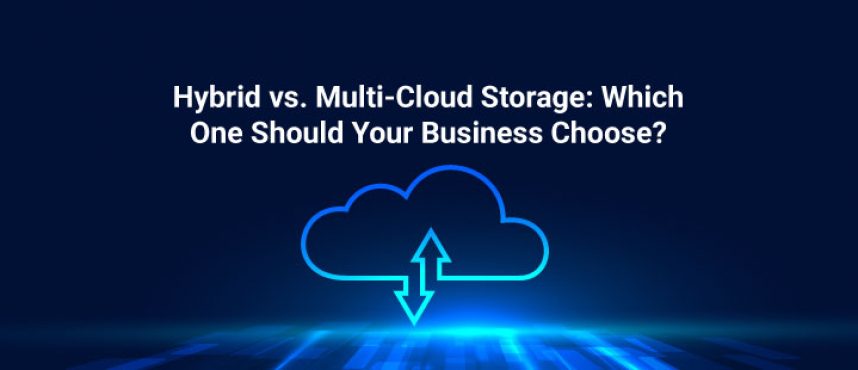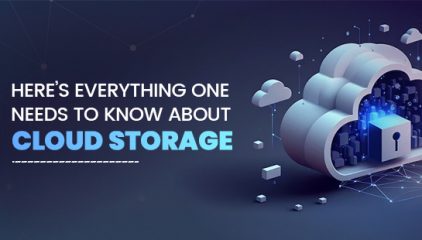Hybrid vs. Multi-Cloud Storage: Which One Should Your Business Choose?
This is a very diverse topic as companies have completely advanced in terms of how they used to tackle data sets around a decade ago. With the advent of both multi and hybrid-cloud settings into the IT ecosystem, businesses like yours are getting confused about which one to opt for.
Moreover, you can’t just skip this part as cloud storage is the ultimate solution for any business data needs. Once you identify the right storage settings, only then you can operate your business at ease without any downtime. To excel in this domain, you have to understand the difference of the two.
This article will unravel each of the cloud storage options and help you navigate through their hurdles, advantages, and key nuances. Consider this as an appropriate guidebook from the house of Network Techlab. Being a pioneering IT services and consulting firm for over 29 years, you can count on the insights as provided in this blog.
Comprehending the Two Cloud Storage Types
- Multi-Cloud: Think of operating with diverse cloud services from a wide range of providers within a singular structure. So, if your enterprise is seeking some help to revitalize multiple cloud platforms, then this is the best bet.
The substantial trait of a multi-cloud approach is its versatility. Your business can opt for certain clouds for unique assignments or duties based on inexpensiveness and performance requirements. - Hybrid Cloud: In this setting, think of a merger of a computing environment that binds both shared and personal clouds.. This allows your business to capitalize on the benefits of each while perpetuating control over their sophisticated
You can note down one prominent feature of the hybrid cloud setting, and that is its potential to enable smooth interoperability between private and public ecosystems.
Virtues of Both Cloud Storages
- Multi-Cloud: It minimizes unplanned downtime or outages since it minimizes the risk of single point failure. In simple terms- an outage in a particular cloud won’t necessarily would impact the services in the other. You can seamlessly switch your computing needs to the cloud which is up and running.
Moreover, this option comes with less overhead costs and allows you to scale up and down according to your requirements. - Hybrid Cloud: The two substantial factors that make most businesses stick to this cloud setting is that it offers both versatility and resilience against unanticipated issues.
Subsequently, enterprises can promptly switch functionalities to another platform if one provider experiences downtime. You can imagine how efficiently it’s going to safeguard your enterprise data.
Obstacles: Embracing the respective Cloud Storages
- Multi-cloud setup has a unique ask for its acceptance-
- The governance and merger of varied services offered by different providers is a significant task altogether. Moreover, every cloud platform has its own set of interfaces, tools and regulations, which can form functional silos.
- Significant security susceptibility throughout diverse platforms makes things
- Bridging the skill gap within IT teams can be daunting.
- Well, a hybrid cloud setup can be overwhelming too-
- Understanding the complex sync between two clouds (public and private cloud platforms) is a challenge.
- Juggling workloads effectively between a public and private cloud setup is quite
- In this scenario, the exchange of data becomes an endangered act due to security concerns.
Prominent Differences Between the Two Data Storages
- Implementation and Framework: Schemes related to multi-cloud include capitalizing on cloud solution caterings from varied dealers without amalgamating them into a unified system.
On the flip side, a hybrid cloud strategy integrates both private and public clouds, allowing applications and data to exchange smoothly.
- Factors respective to Growth: A multi-cloud ecosystem can boost operability through redundancy, allowing enterprises to refrain from vendor lock-in. On the flip side, hybrid cloud setups lead in offering customized performance through tailored services.
In terms of scaling, multi-cloud settings offer companies unmatched agility since they can shift across varied platforms smoothly. In contrast to this, hybrid cloud solutions offer businesses a controlled ecosystem where they can scale according to their own needs and regulatory standards.
- Budgetary Perspectives: Multi-cloud might seem less budget-friendly due to substantial service overlap, yet it offers transparency in pricing, rendering it economical in the long run. Whereas a hybrid cloud setup can sometimes become costly due to maintenance efforts, it enables organizations with probable cost control that coincides directly with their business operations, along with financial strategies.
Conclusion
As an intriguing fact, there happen to be diverse cloud storage providers in India, but very few will act promptly and accurately. The above distinction might have given you a brief understanding to get you started, but an expert opinion is always recommended.
So, it will be best for you to reach out to our experienced team at Network Techlab, who knows the intricacies regarding each of them. With over 25+ years of pioneering this domain and serving cloud storage services to over 100+ organizations in India, you can rely on our customized services that help your business run the extra mile without any downtime.





